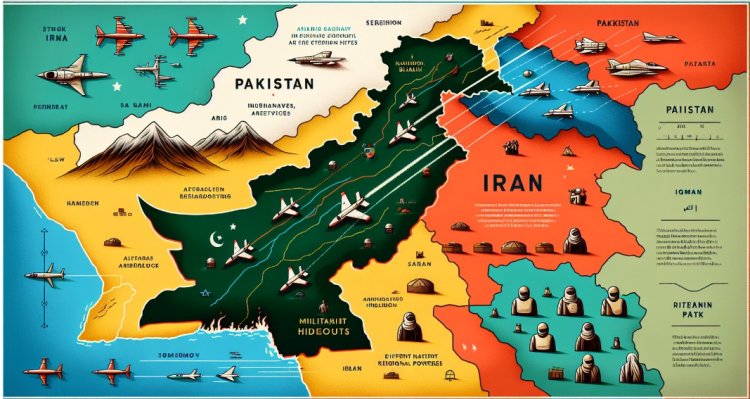Pakistan and Iran: Escalating Tensions and Regional Implications
Tensions flare between Pakistan and Iran! Dive into the flashpoints, historical grievances, and potential domino effect of this escalating conflict. Explore paths to diplomacy and de-escalation for a peaceful future.

Introduction
In recent days, tensions between Pakistan and Iran have escalated with a series of tit-for-tat air strikes. These attacks have targeted militant hideouts and terrorist groups in both countries. Pakistan responded to Iran's show of force by launching its own strikes on Iranian territory. This exchange of strikes has led to a diplomatic crisis, with Pakistan recalling its ambassador to Iran and stopping the Iranian counterpart from returning to Pakistan.
The official targets of these attacks have been militant groups and separatists that pose a threat to the security of each country. However, the situation has raised concerns among regional powers, who are calling for calm. The international community has also taken notice, recognising the potential implications that these air strikes may have for the region and the world.
It is important to note that Pakistan is a nuclear power, and Iran's willingness to provoke Pakistan with a military strike raises questions about Iran's self-confidence and its assessment of the situation. Additionally, the targeting of Baluchi separatists by both countries is rooted in domestic politics and concerns over separatist tendencies.
Pakistan's Response to the Iranian Attack
Pakistan has confirmed that it launched strikes in the Sano Baluchistan province of Iran in response to the Iranian attack on its territory. The military operation was highly coordinated and specifically targeted at terrorist hideouts. The strikes resulted in the killing of several terrorists.
The official targets of the Pakistani strikes were identified as militant groups that posed a threat to the security of both Pakistan and Iran. It is important to note that no Iranian nationals were targeted during the operation, contrary to Iran's claims.
The exchange of strikes has shed light on the presence of an Iranian terrorist group called Jaish al-Adl, which has taken shelter in some provinces inside Pakistan. This group has been a cause for concern for both Iran and Pakistan due to its activities that threaten the security of the region.
The Pakistani government, including the Army, was taken by surprise by Iran's attack on its territory. As a nuclear power, Pakistan had few options but to respond with force to protect its national security. The willingness of Iran to provoke Pakistan with a military strike is indicative of Iran's self-confidence and its assessment of the situation.
While the official targets of the strikes were terrorist hideouts and separatist groups, the situation has raised concerns among regional powers. It is crucial for both Pakistan and Iran to exercise restraint and find diplomatic solutions to prevent further escalation of tensions.
Potential for war?
Views on the possibility of a war between Pakistan and Iran:
-
Both sides have made it clear that they see their attacks as targeting terrorists or separatists rather than each other.
-
There is currently no danger of an escalation between these two countries.
Both sides' claims of targeting terrorists:
-
Pakistan confirms that its strikes were aimed at terrorist hideouts in the Sano Baluchistan province of Iran.
-
No Iranian nationals were targeted during Pakistan's operation, contrary to Iran's claims.
-
The exchange of strikes has revealed the presence of an Iranian terrorist group, Jaish al-Adl, taking shelter in some provinces inside Pakistan.
Absence of danger for escalation:
-
Pakistan's military response to Iran's attack was a result of surprise and the need to protect national security.
-
As a nuclear power, Pakistan had limited options but to respond with force.
-
Iran's willingness to provoke Pakistan with a military strike showcases Iran's self-confidence and assessment of the situation.
Surprise and justification for Pakistan's military response:
-
The Pakistani government, including the Army, was taken by surprise by Iran's attack.
-
Iran's attack on a nuclear-armed neighbour was unexpected.
-
In the logic of nation-states, an Iranian attack on Pakistani territory warranted a military response.
Nuclear power dynamics
Iran's recent willingness to provoke Pakistan with a military strike raises questions about Iran's self-confidence and its assessment of the situation. Despite Pakistan being a nuclear power, Iran took the risk of escalating tensions by launching an attack on its territory.
This self-confidence may stem from Iran's previous proxy attacks in the region. Iran has supported various proxy groups in countries like Lebanon, Syria, Iraq, Yemen, and the Gaza Strip. These proxies have carried out attacks on different targets without any significant military response from the affected countries.
However, attacking a nuclear-armed neighbour like Pakistan has significant implications. Pakistan, as a nuclear power, had limited options but to respond with force to protect its national security. The surprise attack by Iran on Pakistani territory was unexpected and warranted a military response according to the logic of nation-states.
The absence of a military response in previous proxy attacks may have led Iran to believe that it could get away with attacking Pakistan. However, this latest escalation in tensions highlights the risks involved in provoking a nuclear-armed neighbour.
Targeted Militants and Domestic Politics
Background on Baluchi separatists in eastern Iran:
The Baluchi separatists in eastern Iran have been a problem in the country for more than 20 years. They have perpetrated several attacks, especially on the Revolutionary Guards, in recent months. These separatists pose a threat to the security of Iran.
Recent attacks by Baluchi separatists on Revolutionary Guards:
The Iranian government has been targeted by Baluchi separatists, particularly the Revolutionary Guards, through a series of attacks. These attacks have heightened tensions and prompted retaliatory strikes by both Iran and Pakistan.
Iran's goal of displaying its ability to combat jihadist groups:
One of Iran's primary goals in launching the attack on the Baluchi separatists was to showcase its ability to combat jihadist groups within its borders. This was particularly important following attacks claimed by the Islamic State and Baluchi separatists in the country.
Deeper reasons for the Iranian attack relate to domestic politics:
The Iranian attack on the Baluchi separatists was not solely motivated by events in the Middle East. Instead, it was driven by domestic politics. Iran wanted to demonstrate to its citizens that it was willing and able to fight jihadist groups on its soil. Additionally, Iran is concerned about separatist tendencies in different regions of the country, such as Beluchistan, Southwest Iran, and Iran Kurdistan.
Conclusion
The escalating tensions between Pakistan and Iran have raised concerns among regional powers and the international community. It is essential to assess the situation and its potential implications for the region.
The willingness of Iran to provoke Pakistan with a military strike highlights Iran's self-confidence and its assessment of the situation. However, attacking a nuclear-armed neighbour like Pakistan carries significant risks and has led to a diplomatic crisis between the two countries.
Understanding the domestic politics in both Pakistan and Iran is crucial to analysing the situation. Baluchi separatists in eastern Iran and their attacks on the Revolutionary Guards have been a longstanding issue for Iran's security. Iran's attack on these separatists was driven by domestic politics and its goal to showcase its ability to combat jihadist groups within its borders.
It is important to exercise restraint and find diplomatic resolutions to prevent further escalation of tensions. Both Pakistan and Iran need to prioritise diplomatic solutions and engage in international involvement to address the root causes of the conflict and ensure regional stability.



 admin
admin 










